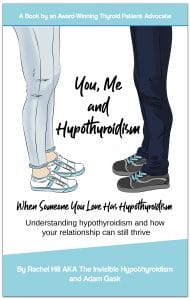Many people living with hypothyroidism come up against misconceptions about having the condition. Let’s address some of the common ones.
1. My Hypothyroidism isn’t All in My Head
Many thyroid patients are made to feel as if they’re over-exaggerating, dramatising or making up just how much they go through with hypothyroidism.
I can tell you as someone who was diagnosed “only borderline hypothyroid” that I didn’t feel ‘borderline’ or ‘mild’ in my symptoms at all!
Unless you are in our shoes, you cannot make a call on what is and isn’t real. Do you know our minds and bodies as well as we do?
2. My Hypothyroidism isn’t Laziness
Thyroid fatigue is relentless. We can become exhausted from just emptying the washing machine, taking a shower or walking up the stairs. I’m not lazy, my body is fighting itself.
Having hypothyroidism can mean that our metabolism is quite a bit slower than yours, so we don’t have as much energy as we should. This means we can become easily tired and often feel tired all the time.
In fact, it’s more than just being tired, it’s every-second-I’m-consciously-having-to-keep-each-eyelid-open tired. It’s I’m-scared-to-blink-or-I’ll-fall-asleep tired. It is seriously frustrating and interfering.
3. My Hypothyroidism isn’t Gluttony
Weight fluctuations are common with hypothyroidism. The is because the main purpose of thyroid hormone is to ensure the metabolism is running properly, and the metabolism’s job is to produce heat and fuel to keep us warm and give us energy.
Being hypothyroid, we often don’t have enough thyroid hormone, so our metabolism doesn’t work as well as regular peoples’. Therefore, people with hypothyroidism can have a slower metabolism with symptoms such as cold intolerance, extreme tiredness and weight gain. Weight can even fluctuate up and down.
We can gain weight without changing what we eat or drink, or even gain weight despite eating next to nothing.
4. My Hypothyroidism isn’t Easily Treated
Some people start thyroid medication and feel well again quite soon after, and these are very lucky people. For others, it can take months or even years to get their thyroid medication right.
It usually takes a good few weeks for it to start kicking in, once we get the dosage and type of medication right for us. Some patients take years to get this sorted, since doctors aren’t usually very helpful when it comes to trying different medication options to see what works for each individual thyroid patient.
And even when we do get our thyroid medication right, we can have other conditions that have developed because of the hypothyroidism not being adequately treated for quite some time. This can include vitamin deficiencies, adrenal problems, mental health conditions and acid reflux to name just a few.
We can also go through flare days, weeks or months, where symptoms increase and worsen. It can be very up and down and not always a straight path back to decent health.
5. My Hypothyroidism isn’t Curable
90% of the cases of hypothyroidism are caused by Hashimoto’s, the autoimmune disease that destroys the thyroid gland, leading to loss of function. There is no cure for this.
It can be put in to remission (though not everyone achieves this) and a lot of people don’t even know if their hypothyroidism is autoimmune.
6. My Hypothyroidism isn’t My Fault
I always had the disposition to develop this condition and whether it was triggered was up to environmental factors. However, it is not my fault.
7. My Hypothyroidism isn’t Easy To Live With
Like I touched on above, some people live well with hypothyroidism after nothing more than starting on medication, but for so many people it unfortunately isn’t this easy and it would be silly to assume otherwise.
It has taken me countless years to get my health back to a good place.
My experience with hypothyroidism has seen me struggle to stay in employment, be bed-bound by the symptoms of it and spend more time having tests and sitting in doctor’s waiting rooms than I care to admit!
Related post: 11 ‘Harmless’ Things Said by Doctors That Actually Hurt Thyroid Patients
What things is your hypothyroidism ‘not’? Share in the comments.
***
See also:
You, Me and Hypothyroidism: When Someone You Love Has Hypothyroidism, a book for those who know someone with hypothyroidism. Understand how it affects your loved one with this handy book.
***
Please remember that if you’re a thyroid patient living with poor mental health or lingering physical symptoms, that you don’t have to live this way. To address why you may still be feeling unwell (often despite being on thyroid medication too), please see this article and go through each suggestion, putting your thyroid jigsaw back together.






